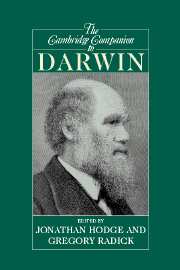Book contents
- Frontmatter
- Introduction
- PART I DARWIN’S THEORISING
- PART II HISTORICAL CONTEXTS
- 6 Is the theory of natural selection independent of its history?
- 7 Darwin’s science and Victorian philosophy of science
- 8 Darwin and Victorian Christianity
- 9 Darwin, social Darwinism and eugenics
- 10 From Darwin to today in evolutionary biology
- PART III PHILOSOPHICAL THEMES
- PART IV WAYS FORWARD
- Guide to further reading
- List of references
- Index
10 - From Darwin to today in evolutionary biology
from PART II - HISTORICAL CONTEXTS
Published online by Cambridge University Press: 28 May 2006
- Frontmatter
- Introduction
- PART I DARWIN’S THEORISING
- PART II HISTORICAL CONTEXTS
- 6 Is the theory of natural selection independent of its history?
- 7 Darwin’s science and Victorian philosophy of science
- 8 Darwin and Victorian Christianity
- 9 Darwin, social Darwinism and eugenics
- 10 From Darwin to today in evolutionary biology
- PART III PHILOSOPHICAL THEMES
- PART IV WAYS FORWARD
- Guide to further reading
- List of references
- Index
Summary
THE PERSISTENCE OF DARWINISM
For nearly one-and-a-half centuries, biologists interested in evolution have been haunted by the question of whether their conceptions are or are not 'Darwinian'. While it may not be unique, this persistent positioning of new developments in relation to a single, pioneering figure is quite exceptional in the history of modern natural science. Physicists currently working in the domains of relativity or quantum theory may refer sometimes to Einstein or Bohr; but their debates are not massively structured by this reference as evolutionary theory has been and remains structured by reference to Darwin. A proximate cause of Darwin's enduring presence is that evolutionary biologists have never stopped reading him. The remarkably numerous editions and translations of Darwin's books have in themselves helped to make this possible. But the availability of key texts only takes us so far in understanding why evolutionary biologists go on reading Darwin, referring to him, feeling the necessity of labelling their theories as 'Darwinian' or 'non-Darwinian' or 'anti-Darwinian'.
Indeed, on the face of it, there are compelling reasons for modern biologists to avoid affiliating their work with Darwin’s. Darwinism does not belong only to the history of science; it also belongs to cultural and political history.1 Among other things, neo-liberal economics, social Darwinism, racial anthropology, Nazi ideology and the materialistic monism of Darwin’s German supporter Ernst Haeckel had strong interactions with Darwinism in the first century of its history. Likewise, in more recent times, sociobiology (in its more ideological forms), American liberalism and the European right-wing have been more thoroughly committed to Darwinism than their opponents.
- Type
- Chapter
- Information
- The Cambridge Companion to Darwin , pp. 240 - 264Publisher: Cambridge University PressPrint publication year: 2003
- 11
- Cited by



